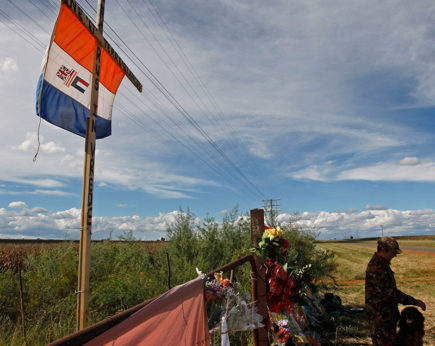
PRETORIA, South Africa – A landmark Aug. 21 ruling by South Africa’s Equality Court has criminalized gratuitous displays of the national flag of the apartheid era. The case was brought before the court by the Nelson Mandela Foundation, backed by the South African Human Rights Commission.
The apartheid flag is often displayed by far-right white supremacists in South Africa. They still reject the democratic dispensation that began in 1994, following a grinding liberation struggle against white minority rule that was condemned globally as a crime against humanity.
The reemergence of fascism in many countries worldwide and insidious seeping of racist hate speech into the political mainstream has emboldened South Africa’s white racists.
They tended to keep their heads down in the first decade or so after the country’s transition to democracy, but are now more conspicuous. Incidents of assaults and verbal abuse by white racists against black people have increased massively in recent years.
Many such cases have led to police and court action. But by and large, the effects have been lightly punitive rather than transformative.
South Africa’s white community, the wealthiest enclave in this the world’s most unequal society, has resisted the self-awareness and self-scrutiny needed to shed its racism.
The ardent wavers of the flag of the old apartheid regime make up a small extremist section of this community, but one that melds pretty seamlessly with its mainstream.

The old apartheid flag, an inelegant composite of colonial emblems featuring in miniature the flags of the South African Republic, the Orange Free State, and the British Union Jack, was adopted by the white regime in 1928, twenty years before the lurch to the massive assault on the black majority population that comprised apartheid.
When the policy and ideology of apartheid became the core of government policy, from 1948 onwards, ramping up and formalizing the racist segregation that had prevailed before, the flag remained in use. This was despite efforts by apartheid’s trailblazers, the ruling Nationalist Party, to excise the British colonial symbolism. And so the flag flew high over the racist regime, becoming a symbol everywhere of a country that was famously dubbed “the skunk of the world.”
The Nelson Mandela Foundation eloquently described the destructive impact that the old South African flag represents:
“Gratuitous displays of the old flag express a desire for black people to be relegated to labor reserves, a pining for the killing, the torture, the abductions, a melancholia for the discrimination, the death squads, the curfews and the horrific atrocities committed under the flag.”
The two respondents in the case before the Equality Court are Afrikaner lobbying forums, the white nationalist Afriforum and the Federation of Afrikaans Cultural Societies. Their argument was that banning the old flag would be a violation of freedom of expression, guaranteed by the South African Constitution.
They also contended that the gratuitous parading of the old flag could not constitute hate speech, as the relevant law concerning this – the Equality Act – dealt with the racist and discriminatory impact of words, not symbols.
The Nelson Mandela Foundation argued that the Equality Act needs a broader interpretation to cover the racist and discriminatory power of symbols as well as words.
In his ruling, Equality Court Judge Phineas Mojapelo rejected the argument that banning the old flag was a blow to freedom of expression.
The Constitution guarantees freedom of expression as long as it does not include advocacy of hatred based on race, ethnicity, gender or religion. So displaying the old flag, a provocative symbol of the apartheid era of racial oppression, is clearly tantamount to incitement of such hatred.
Judge Mojapelo said, “Displaying the old flag does much more than merely cause offense … It demeans and dehumanizes people on the basis of their race. It impairs their human dignity.” It constitutes hate speech.
His interpretation of symbols being an aspect of speech hinged in part on U.S. case law, where the First Amendment’s protection of freedom of speech has been interpreted as extending – significantly enough – to burning the U.S. flag. His point was not about freedom of speech but the meaning of “speech.”
The Nelson Mandela Foundation lauded the ruling as a thumbs up for South Africa’s judicial system, and it stressed the difference between gratuitous displays of the racist flag and its use in other contexts, such as in academic contexts, museums, and works of art.
On his Radio 702 morning talk show the day after the court ruling, Sizwe Mpofu-Walsh celebrated the banning of the old flag for “putting paid to the myths that racism can be tolerated under the guise of free speech. For too long people with racist intentions and racist motives pretend as if free speech matters so they can spew their racism and trample on the dignity of an already damaged people.”
And yet, the radio jock pointed out, just hours after the court ruling, the deputy CEO of Afriforum, Ernst Roets, gave the middle finger to the Equality Court and the millions of unrecompensed victims of the apartheid era by tweeting an image of the old flag with the caption “Did I just commit hate speech?”
For Mpofu-Walsh and most of his listeners, the answer is an unequivocal Yes. Before many minutes passed one of his callers announced that a criminal complaint would be filed against Roets.










